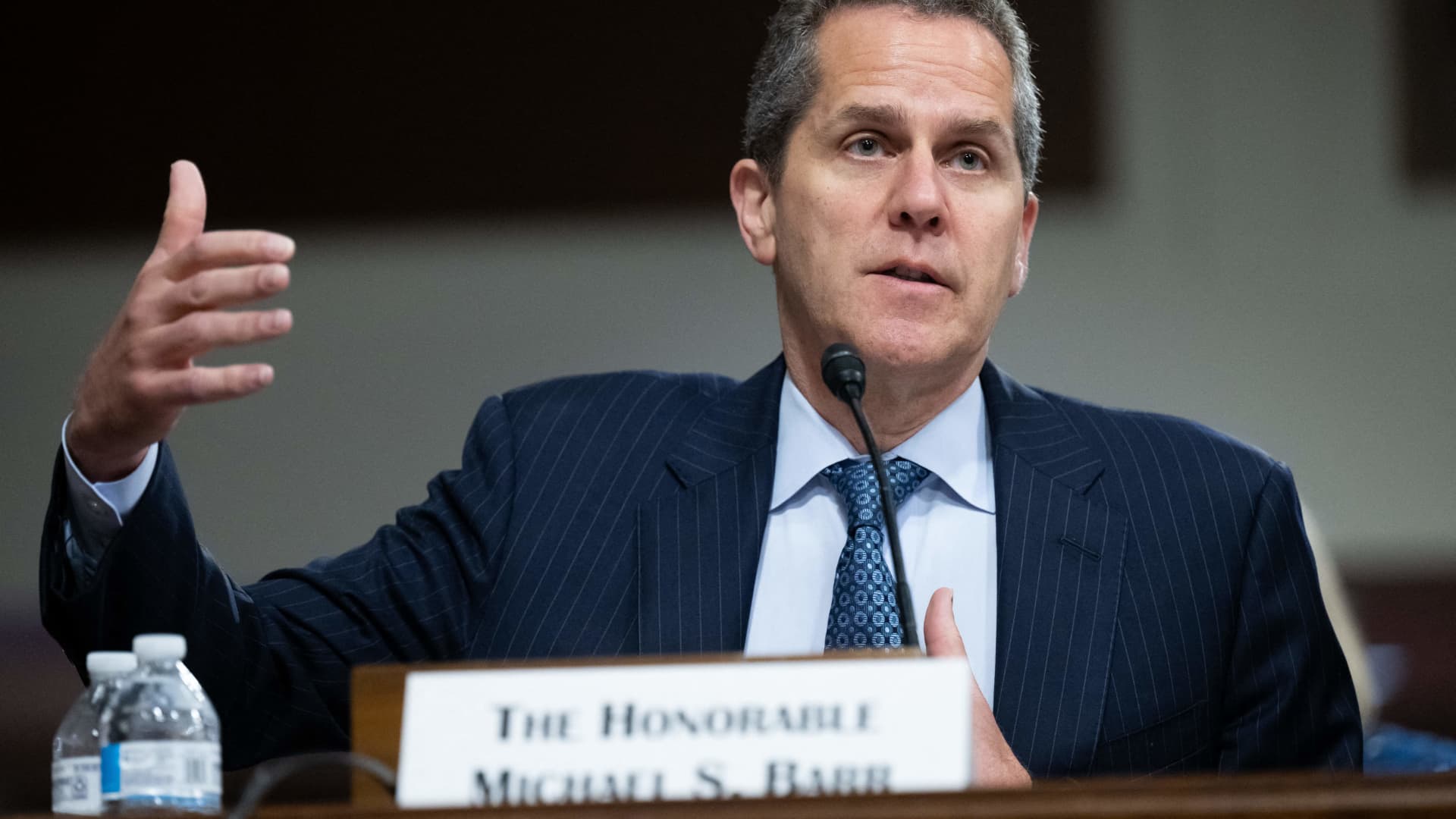Michael Barr, Vice Chair for Supervision at the Federal Reserve, testified about recent bank failures during a US Senate Committee on Banking, House and Urban Affairs hearing on Capitol Hill in Washington, DC, on May 18, 2023.
Saul Loeb | AFP | Getty Images
All 23 of the U.S. banks included in the Federal Reserve’s annual stress test successfully weathered a severe recession scenario while continuing to provide loans to consumers and corporations, as stated by the regulator’s announcement on Wednesday.
According to the Federal Reserve, despite the projected losses totaling $541 billion for the Banks, they were able to maintain the required minimum capital levels and sustained their lending to the economy during the hypothetical recession.
The stress test, which originated after the 2008 financial crisis, aims to determine the amount of capital that banks can allocate for shareholder returns like buybacks and dividends. This year’s exam subjected the banks to a “severe global recession” that included a 10% surge in unemployment, a 40% decline in commercial real estate values, and a 38% drop in housing prices.
It should be noted that the stress test only applies to larger banks like JPMorgan Chase and Wells Fargo, as well as international banks with significant operations in the U.S. and major regional players like PNC and Truist. Smaller banks are exempt from the test. However, following the collapse of three mid-sized banks earlier this year, increased regulations on regional banks are anticipated, and international standards are expected to raise capital requirements for the country’s largest banks.
“Today’s results confirm that the banking system remains strong and resilient,” said Michael Barr, Vice Chair for Supervision at the Federal Reserve, expressing satisfaction with the performance of the banks. “However, we must remain vigilant and continue to strengthen the resilience of banks to various economic scenarios, market shocks, and other stresses.”
Goldman’s credit card losses
According to the Federal Reserve, out of the projected losses of $541 billion, 78% were attributed to loan losses, while the remaining losses were primarily due to trading losses at Wall Street firms. The rate of loan losses varied among banks, ranging from 1.3% at Charles Schwab to 14.7% at Capital One.
Among the various loan products, credit cards posed the biggest challenge, with an average loss rate of 17.4% for the group. Commercial real estate loans followed with an average loss rate of 8.8%. Goldman Sachs had the highest loss rate of nearly 25% among card lenders, followed by Capital One with a 22% rate. The mounting losses in Goldman’s consumer division in recent years, particularly from credit-card loans, led CEO David Solomon to pivot away from the company’s retail banking strategy.
Regional banks pinched?
During the hypothetical recession, the total capital levels of the banks dropped from 12.4% to 10.1%. However, this average figure disguises more significant impacts on banks with higher exposure to commercial real estate and credit-card loans, such as regional banks like U.S. Bank, Truist, Citizens, M&T, and card-centric Capital One. Although these banks’ capital levels remain above the current standards, they could face challenges if upcoming regulations require higher capital levels.
According to Jefferies analyst Ken Usdin, big banks performed better overall compared to regional and card-centric firms. Capital One, Citigroup, Citizens, and Truist could face the most significant increases in required capital buffers after the stress test. Given the uncertainties related to upcoming regulations and the potential risks of an actual recession in the near future, analysts predict that banks will adopt a relatively conservative approach to their capital plans.
On Friday, after regular trading hours, banks are expected to disclose their updated plans for buybacks and dividends.
Denial of responsibility! VigourTimes is an automatic aggregator of Global media. In each content, the hyperlink to the primary source is specified. All trademarks belong to their rightful owners, and all materials to their authors. For any complaint, please reach us at – [email protected]. We will take necessary action within 24 hours.
Denial of responsibility! Vigour Times is an automatic aggregator of Global media. In each content, the hyperlink to the primary source is specified. All trademarks belong to their rightful owners, and all materials to their authors. For any complaint, please reach us at – [email protected]. We will take necessary action within 24 hours.


